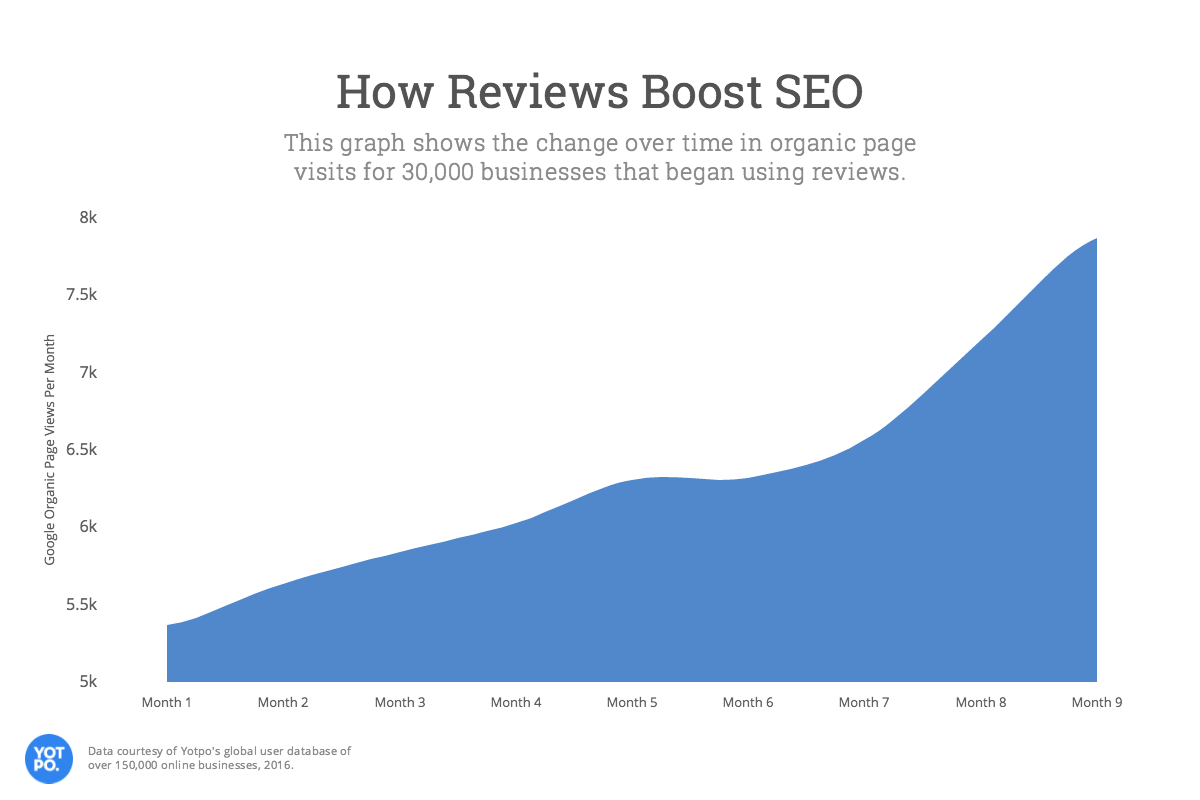Search engines aren’t just listening to what you have to say about yourself – they’re listening to what other people have to say about you.
Originally, we took a look at 500 sites who use reviews to track how their SEO rankings improved over the course of a few months. We were impressed with the results, but we couldn’t say for sure that their SEO rankings improved solely because of getting more reviews.
While we do know that was the one similarity all these sites shared, what if there was some other reason their SEO traffic increased?
We wanted to look at a huge group that included businesses of all sizes and in all industries so we could really see how SEO traffic increased when the only common denominator was adding reviews to their site.
We also wanted to look at a longer period of time – 9 months compared to 3 – to see if the increase continued over time.
Here’s what we found:

Now that’s pretty amazing.
Clearly, reviews are a powerful form of customer content that has huge implications for SEO and boosting organic traffic.
So now that we know the facts – it’s time to dig into understanding why.
Why Do Reviews Matter For SEO?
SEO rankings are placing more weight than ever on what users have to say.
Reviews are one form of user-generated content that search engines take into consideration.
User-generated content racks up serious SEO points by providing sites with fresh content, bundles of backlinks, and sources for organically shaping natural attributes.
5 Reasons Why Reviews Benefit SEO
Learn exactly why customer reviews are so good for helping you rise in search engine results…
1. Reviews provide search engines with fresh, relevant content
It’s not always possible (or beneficial) for a brand to churn out tons of new content, especially if this content is specifically produced for SEO purposes, but search engines want to see your site is active, so what’s a brand to do?
Collect user-generated content!
Consumer generated media is a low-effort way to power your site and social media channels with unique, authentic content.
This fresh, relevant content shows your site is active and valuable to the customers you cater to.
Additionally, it creates conversations among customers to demonstrate you aren’t just talking to your customers, but they are talking with you and about you.
This is serious SEO gold that’s almost impossible to rival with any other marketing strategy.
2. Reviews shape basic SEO attributes naturally
Sites are optimized for search engines through a system of basic attributes such as keywords, titles, back-links, and internal links.
When it comes to reviews, customers work as an army of link builders and keyword writers so your SEO structure is shaped without you having to lift a finger.
3. Reviews naturally help your site rank for long-tail keywords
In contrast to highly competitive, general search items, long-tail keywords are specific phrases with low search competition that are much easier rank highly for.
However, the problem is knowing which long-tail keywords matter.
Luckily, by looking at real customer comments you can see how they are really phrasing their concerns and you can then integrate these phrases as keywords for your on-site optimization.
This also helps you better improve your brand messaging to use the words your customers want to hear.
4. Reviews boost social SEO
Social media optimization (SMO) is a form of optimization that deals specifically with social sites.
User-generated content like reviews help SEO through SMO, because it often comes in the form of social shares, likes, or commenting, or common threads like hashtags that point back towards a brand.
Social SEO is largely built upon user-generated content.
For example, if many people in your network are sharing, liking, or commenting on similar news, it rises to your attention. In contrast, content that no one is buzzing about have minimal impact on social SEO.
And when it comes to social commerce, boosting your results pays off.
5. Reviews are great for both automatic and manual optimization
Automatized search engine algorithms use spiders that look for customer content product reviews and testimonials to evaluate a website.
Additionally, human teams known as search quality raters manually evaluate a site’s reputation, looking for aspects like expertise, authority, and truth, all of which are gained through excellent customer content.
Content written by customers gives sites legitimacy and it earns SEO juice both from manual and automatic rating systems.
This should be a vital part of any local SEO checklists, as reviews and ratings can make it easier to stand out in search engine results.
So now, let’s tackle a few commonly asked questions about reviews impact on search engine rankings.
Do negative reviews hurt SEO?
Many people are under the false impression than bad reviews will hurt their SEO.
In reality, you won’t be penalized. Google knows no one is perfect, and that even the best sites can get bad reviews.
Their team of manual reviewers are taught take negative review with a grain of salt and dig deeper to understand the overall reputation of a site.
Their guide for manual SEO rates specifically says to read the negative reviews and bad feedback before assuming this reflects a site’s reputation accurately.
In this way, Google will not penalize sites who receive bad reviews if there is more content that points to the site being reputable, since it makes for more natural ratings on Google overall.
How can I boost the SEO power of my UGC?
Your UGC isn’t doing enough for you if it’s not properly optimized for SEO.
A common SEO issue for eCommerce sites is that product review functionality tends to rely on AJAX, iframes, or subdomains, which make it very difficult, or even impossible, for search engines to match product reviews with product pages.
Luckily, there are a couple of solutions.
The best solution is to embed review content as part of the html code (also known as in-line SEO), although this requires a complicated integration.
While difficult, it ultimately increases crawl frequency and generates almost two times referring search phrases and non-brand organic traffic.
An easier alternative than embedding review content in HTML is to add a minisite, or a static webpage that contains all the data generated from product reviews.
Learn how Yotpo helps our users get the biggest benefit from their reviews:
Conclusion
Reviews aren’t just great for increasing conversion, boosting customer trust, and powering word-of-mouth marketing – they help you get more traffic from search engines.
Plus, that traffic is great quality because it has high search intent.
Here’s a few ways to start collecting reviews to power your SEO:
- Integrate reviews or testimonials on your site and offer discounts or coupons for writing or sharing reviews.
- Use in-site FAQ sections and forums that encourage discussion between users and build up long-tail keywords.
- Find a cohesive hashtag for a marketing campaign or your brand and encourage users to use it.













 Join a free demo, personalized to fit your needs
Join a free demo, personalized to fit your needs